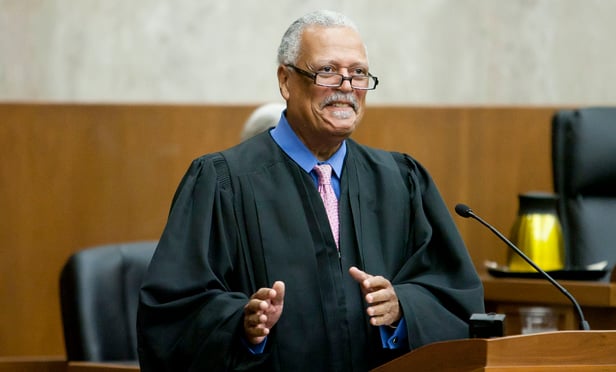In Flynn Case, Emmet Sullivan Will Brief DC Circuit About Power of Trial Judges
The Michael Flynn dispute in the D.C. Circuit tees up a fresh clash over the role federal trial judges play in presiding over criminal prosecutions.
May 21, 2020 at 06:05 PM
7 minute read
 Judge Emmet Sullivan, U.S. District Court for the District of Columbia. Photo: Diego M. Radzinschi/ALM
Judge Emmet Sullivan, U.S. District Court for the District of Columbia. Photo: Diego M. Radzinschi/ALM
A federal appeals court on Thursday directed the judge presiding over the case of Michael Flynn to respond to the former Trump national security adviser's petition for a quick dismissal of his criminal prosecution.
In a one-page order, a panel of the U.S. Court of Appeals for the D.C. Circuit set a June 1 deadline for U.S. District Judge Emmet Sullivan of the District of Columbia to respond to Flynn's challenge to his refusal to readily grant the Justice Department's move to dismiss the case. The panel included Judges Karen L. Henderson and Robert Wilkins, along with Judge Neomi Rao, a Trump appointee who has often ruled in favor of the administration in her initial months on the bench.
Last week, instead of immediately granting the Justice Department's move to drop Flynn's case, Sullivan appointed a former federal judge in Brooklyn, John Gleeson, to oppose the abandonment of the prosecution. Gleeson's appointment, along with Sullivan's openness to having other outside voices address the Justice Department's move to drop the case, drew an appeal from Flynn, who asked the D.C. Circuit to order his case dismissed.
The Flynn dispute in the D.C. Circuit tees up a fresh clash over the role federal trial judges play in presiding over criminal prosecutions. The D.C. Circuit's order Thursday pointed to the court's 2016 decision in the case United States v. Fokker Services B.V. Legal scholars have divided in recent days over whether the ruling, in which the D.C. Circuit confronted the power of judges to "second-guess" prosecutorial decisions, positions Flynn to prevail before the appeals court.
"The executive's charging authority embraces decisions about whether to initiate charges, whom to prosecute, which charges to bring, and whether to dismiss charges once brought," Judge Sri Srinivasan wrote for the panel. "It has long been settled that the Judiciary generally lacks authority to second-guess those Executive determinations, much less to impose its own charging preferences."
Flynn's lawyers cited the Fokker decision heavily in their bid to shut down Sullivan's plans for a weeks-long review of the Justice Department's move to dismiss the prosecution.
In a 44-page court filing, Flynn's defense team, calling the Fokker decision "binding precedent," argued Sullivan has no authority to drag out his consideration of whether or not to dismiss the case against Flynn, who twice pleaded guilty to lying to investigators about his communications with Russian's ambassador to the U.S., only to later try to retract that admission of criminal wrongdoing.
"This is an umpire who has decided to steal public attention from the players and focus it on himself. He wants to pitch, bat, run bases, and play shortstop," Flynn's defense lawyers, led by Sidney Powell, a former federal prosecutor, said of Sullivan. "In truth, he is way out in left field."
Some law professors contend the D.C. Circuit's decision in the Fokker case does not control the outcome of Flynn's challenge.
"Fokker concerned a trial court's authority under the Speedy Trial Act to interfere with a proposed deferred prosecution agreement," Andrew Crespo of Harvard Law School and Kristy Parker of Protect Democracy wrote recently at the blog Lawfare. They said the D.C. Circuit's ruling in that case "drew a sharp distinction between cases in a pretrial posture—like all deferred prosecution agreements—and cases like Flynn's in which a defendant has pleaded guilty and the court is called upon to impose a sentence."
Former federal prosecutor Randall Eliason said Wednesday on Twitter: "Fokker is so clearly NOT controlling that both sides are citing it in support of their position. If you think a case about a judge meddling with the terms of a DPA is 'binding precedent' for a case where there has been a guilty plea, then I and many others disagree."
 John Gleeson, partner with Debevoise & Plimpton. Courtesy photo.
John Gleeson, partner with Debevoise & Plimpton. Courtesy photo.Flynn's defense team has urged the appeals court to overturn the appointment of Gleeson, who is now a partner at the law firm Debevoise & Plimpton.
Powell described Gleeson as "a biased and highly political amicus who has expressed hostility and disdain towards the Justice Department's decision to dismiss the prosecution," in an apparent reference to a Washington Post op-ed he had co-authored before his appointment to oppose the government's abandonment of the case.
"Flynn's guilt has already been adjudicated," Gleeson said in the op-ed, which he co-authored with fellow Debevoise & Plimpton partner David O'Neil and Marshall Miller, both former high-ranking Justice Department officials. "So if the court finds dismissal would result in a miscarriage of justice, it can deny the motion, refuse to permit withdrawal of the guilty plea and proceed to sentencing."
Sullivan on Tuesday set a briefing schedule that would take his consideration of the motion to dismiss Flynn's case at least through July.
The judge directed Gleeson to file court papers opposing the Justice Department's motion to dismiss by June 10 and invited other outside voices, or so-called friends of the court, to weigh in on the Justice Department's move to drop the case against Flynn. He also scheduled a court hearing for July 16, setting the stage for blockbuster oral arguments in Washington's federal trial court.
The extraordinary abandonment of Flynn's case inflamed concerns that the Justice Department leadership was undercutting the Russia investigation and politicizing criminal law enforcement.
The maneuvering in the Flynn case came just months after U.S. Attorney General William Barr intervened in the case of Roger Stone, a separate prosecution rooted in Special Counsel Robert Mueller III's investigation, to recommend a more lenient sentence than what career prosecutors had initially suggested for the longtime Trump ally. Previously, Barr was criticized for casting the conclusions of Mueller's investigation in a light more favorable to Trump.
In moving to drop Flynn's case, the Justice Department said it had determined that the FBI lacked a legitimate basis for conducting the January 2017 interview at the core of the prosecution against the onetime Trump national security adviser.
The Justice Department's motion was signed only by Timothy Shea, a former top aide to Barr who was then serving as the acting U.S. attorney in Washington. A career prosecutor who had worked on the Flynn case, Brandon Van Grack, withdrew from the case shortly before Shea filed papers asking Sullivan to dismiss the matter.
Read more:
Barr's Move to Drop Flynn Case Puts Spotlight on 1977 US Supreme Court Ruling
'Unimpeachable Character': John Gleeson, Former Judge, Returns to Court to Take on Barr
Thousands of Ex-Prosecutors Urge Flynn Judge to Question Barr's Move to Drop Case
'The Record Proves Otherwise': Judge Knocks Down Mike Flynn's 'Ambush' Claims
Michael Flynn, Cooperating with Investigators, Pleads Guilty in Mueller Probe
This content has been archived. It is available through our partners, LexisNexis® and Bloomberg Law.
To view this content, please continue to their sites.
Not a Lexis Subscriber?
Subscribe Now
Not a Bloomberg Law Subscriber?
Subscribe Now
NOT FOR REPRINT
© 2025 ALM Global, LLC, All Rights Reserved. Request academic re-use from www.copyright.com. All other uses, submit a request to [email protected]. For more information visit Asset & Logo Licensing.
You Might Like
View All
DC Circuit Rejects Jan. 6 Defendants’ Claim That Pepper Spray Isn't Dangerous Weapon

Supreme Court May Limit Federal Prosecutions Over 'Misleading' but True Statements

US Judge OKs Partial Release of Ex-Special Counsel's Final Report in Election Case
3 minute read
11th Circuit Rejects Trump's Emergency Request as DOJ Prepares to Release Special Counsel's Final Report
3 minute readTrending Stories
- 1Uber Files RICO Suit Against Plaintiff-Side Firms Alleging Fraudulent Injury Claims
- 2The Law Firm Disrupted: Scrutinizing the Elephant More Than the Mouse
- 3Inherent Diminished Value Damages Unavailable to 3rd-Party Claimants, Court Says
- 4Pa. Defense Firm Sued by Client Over Ex-Eagles Player's $43.5M Med Mal Win
- 5Losses Mount at Morris Manning, but Departing Ex-Chair Stays Bullish About His Old Firm's Future
Who Got The Work
J. Brugh Lower of Gibbons has entered an appearance for industrial equipment supplier Devco Corporation in a pending trademark infringement lawsuit. The suit, accusing the defendant of selling knock-off Graco products, was filed Dec. 18 in New Jersey District Court by Rivkin Radler on behalf of Graco Inc. and Graco Minnesota. The case, assigned to U.S. District Judge Zahid N. Quraishi, is 3:24-cv-11294, Graco Inc. et al v. Devco Corporation.
Who Got The Work
Rebecca Maller-Stein and Kent A. Yalowitz of Arnold & Porter Kaye Scholer have entered their appearances for Hanaco Venture Capital and its executives, Lior Prosor and David Frankel, in a pending securities lawsuit. The action, filed on Dec. 24 in New York Southern District Court by Zell, Aron & Co. on behalf of Goldeneye Advisors, accuses the defendants of negligently and fraudulently managing the plaintiff's $1 million investment. The case, assigned to U.S. District Judge Vernon S. Broderick, is 1:24-cv-09918, Goldeneye Advisors, LLC v. Hanaco Venture Capital, Ltd. et al.
Who Got The Work
Attorneys from A&O Shearman has stepped in as defense counsel for Toronto-Dominion Bank and other defendants in a pending securities class action. The suit, filed Dec. 11 in New York Southern District Court by Bleichmar Fonti & Auld, accuses the defendants of concealing the bank's 'pervasive' deficiencies in regards to its compliance with the Bank Secrecy Act and the quality of its anti-money laundering controls. The case, assigned to U.S. District Judge Arun Subramanian, is 1:24-cv-09445, Gonzalez v. The Toronto-Dominion Bank et al.
Who Got The Work
Crown Castle International, a Pennsylvania company providing shared communications infrastructure, has turned to Luke D. Wolf of Gordon Rees Scully Mansukhani to fend off a pending breach-of-contract lawsuit. The court action, filed Nov. 25 in Michigan Eastern District Court by Hooper Hathaway PC on behalf of The Town Residences LLC, accuses Crown Castle of failing to transfer approximately $30,000 in utility payments from T-Mobile in breach of a roof-top lease and assignment agreement. The case, assigned to U.S. District Judge Susan K. Declercq, is 2:24-cv-13131, The Town Residences LLC v. T-Mobile US, Inc. et al.
Who Got The Work
Wilfred P. Coronato and Daniel M. Schwartz of McCarter & English have stepped in as defense counsel to Electrolux Home Products Inc. in a pending product liability lawsuit. The court action, filed Nov. 26 in New York Eastern District Court by Poulos Lopiccolo PC and Nagel Rice LLP on behalf of David Stern, alleges that the defendant's refrigerators’ drawers and shelving repeatedly break and fall apart within months after purchase. The case, assigned to U.S. District Judge Joan M. Azrack, is 2:24-cv-08204, Stern v. Electrolux Home Products, Inc.
Featured Firms
Law Offices of Gary Martin Hays & Associates, P.C.
(470) 294-1674
Law Offices of Mark E. Salomone
(857) 444-6468
Smith & Hassler
(713) 739-1250








